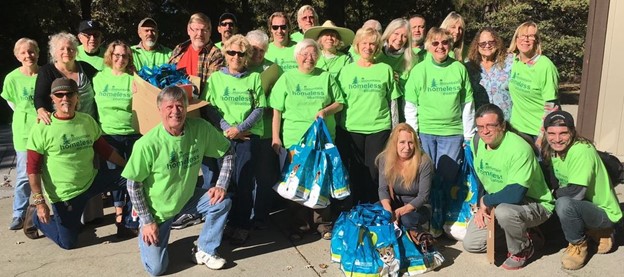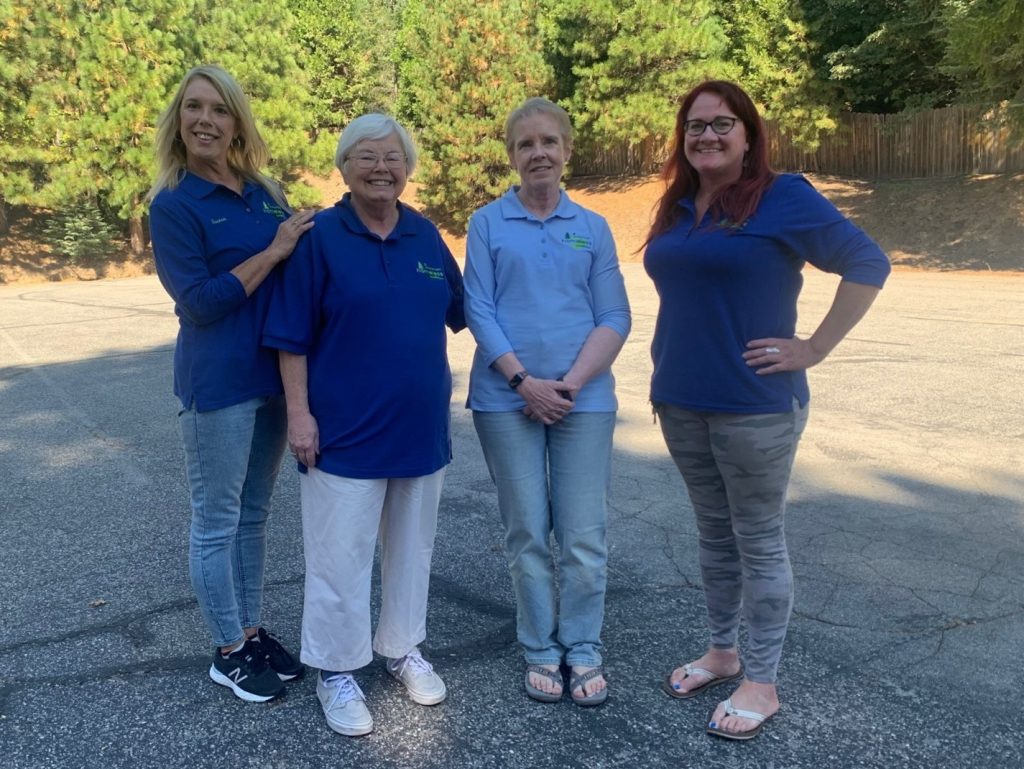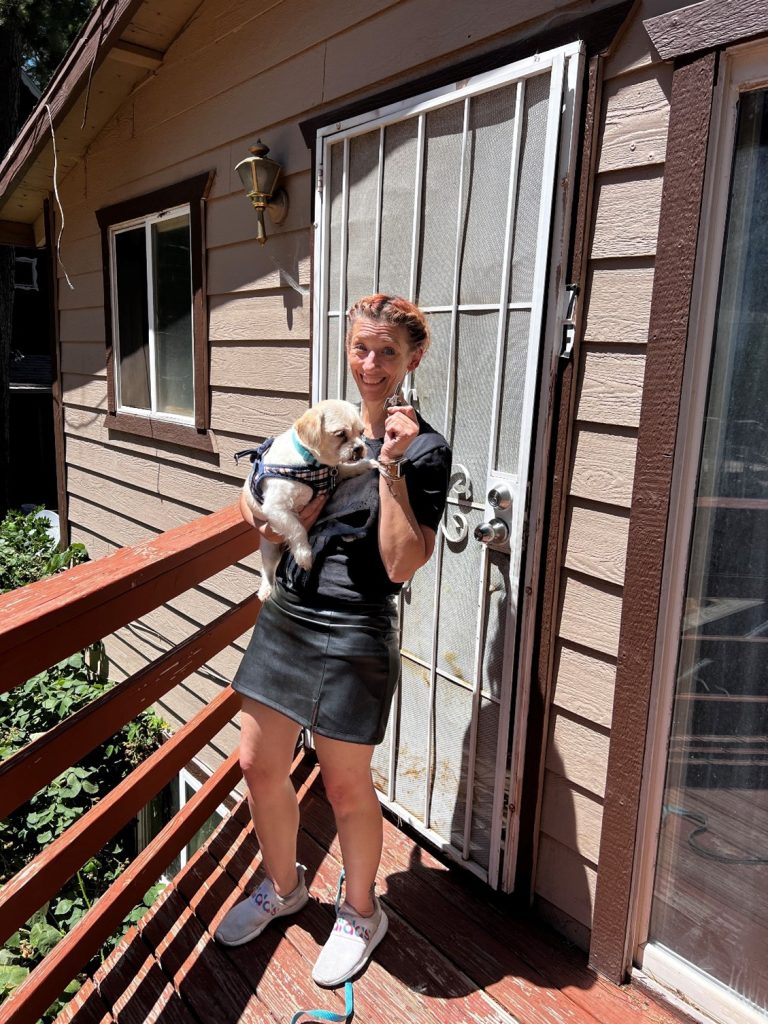By Elliott Bochstein, RCAC staff writer
Beneath the dense pine canopy of the San Bernardino National Forest, Jane, a U.S. Armed Forces veteran and college graduate, faced an adversary she never expected: homelessness. Despite adhering to society’s prescribed path to success, this single mother became part of a fast-growing yet often invisible demographic—the “mobile homeless.” Suddenly, her family’s world had shrunk to the cramped backseat of her deteriorating car.
After fleeing domestic violence, Jane’s search for safety led her and her young son from the sweltering city streets to the breezy and relatively calm mountains. However, this change in scenery brought its own set of hardships, including limited access to essential services like employment opportunities and basic food assistance.
In June 2023, Jane encountered Susan Buckley, a housing navigator from the Mountain Homeless Coalition. Buckley skillfully leveraged the coalition’s resources, alongside veteran-specific aid, and tapped into a network of supportive local landlords to find a permanent housing solution for Jane. Through continuous community support, Jane and her son have a solid foundation to rebuild their lives.

A Crisis Beyond City Limits
Jane’s struggle, while unique in its details, echoes California’s broader trends. Nearly 30% of America’s homeless and half of its unsheltered population reside in the Golden State, where unaffordable housing, sky-high living costs, limited access to crucial mental health resources and a host of other issues have long mired the area in a crisis. The problem disproportionately affects older adults and marginalized groups, with homelessness in California rising by 6% since 2020 — drastically outpacing the 0.4% national increase. A recent study found that a shocking 90% of California’s housing-deprived population lost their housing within the state, with 75% residing in the county where they were last housed. Escalating housing costs remain the primary barrier to escaping homelessness. The crisis, once an urban-centric issue, is increasingly permeating rural communities.
Homelessness has a distinct character in the mountains of San Bernardino County, known for tourist draws like Lake Arrowhead and Big Bear. With its isolation and spacious campgrounds, the national forest naturally attracts many unsheltered individuals. Yet short-term rental platforms like Airbnb, which cater to transient tourism and have converted affordable rentals into high-demand vacation spots, have further aggravated housing insecurity in the area. This shift has upended the region’s housing market, pricing out long-term residents unable to pay the inflated rental costs.
“Often, people have been in their apartments for 10 years with reasonable rent,” explained Sue Walker, MHC’s board president. “When the owner switches to Airbnb, suddenly the available rentals are $500 to $600 more a month.”

From Simple Support to Long-Term Solutions
Since its 2016 inception as a church-based initiative, the Mountain Homeless Coalition has transformed from a simple volunteer effort distributing backpacks with hygiene items and socks into a nonprofit organization offering a wide spectrum of services in partnership with San Bernardino County. “Our initial point-in-time count identified nine homeless people on the mountain. It may seem minuscule, but it proved something that many denied,” recalled Walker. The coalition’s successful advocacy and attainment of nonprofit status in 2017 prompted the county to acknowledge the mountain region’s distinct needs and carve out a new Mountain Homeless Provider Network.
This recognition fueled the expansion of MHC’s services, which now include emergency and permanent housing assistance, utility support, transportation, financial aid, home furnishings and eviction prevention. Central to their operation is the helpline, offering immediate assistance and referrals, particularly for those facing eviction or already without shelter. MHC currently handles over 100 calls per month, reflecting the growing demand for their services.
In the winter, the coalition’s interventions, such as providing shelter to those at risk of frostbite during severe weather, can be lifesaving. In summer 2023, MHC supported 134 households with emergency motel stays, permanent housing, and services like housing navigation.
MHC’s consistent advocacy has also earned them a seat at the table in regional planning and policymaking, and their participation in the Interagency Council on Homelessness has helped them clear up misconceptions about the root causes and nature of homelessness in the mountains.
In 2020, as the COVID-19 pandemic unfolded, the coalition received a $1.1 million grant from California’s Project Homekey. This funding enabled MHC to purchase six cabins in Big Bear for individuals at risk of or experiencing homelessness. MHC plans to acquire six additional units, focusing on those who were previously homeless or earn less than 30% of the area’s median income.

RCAC’s Loan Fund Lifeline
While MHC’s work has had a clear impact on local housing needs, financial sustainability is a constant challenge. The coalition receives only a fraction of funding from the state and primarily relies on grants and community contributions. Government grants’ reimbursement model, which requires MHC to initially bear service costs, has further complicated financial management. Reimbursement delays can often last months or over a year, straining the coalition’s modest resources.
“For a small nonprofit to spend $100,000 and then wait for several months to be reimbursed is virtually impossible,” said Becky Beavers, MHC’s operations director. Despite some recent state reforms, the fundamental challenge of upfront expenditure remains a significant hurdle.
The recurring challenge led MHC to partner with Rural Community Assistance Corporation’s Loan Fund. As a certified Community Development Financial Institution, RCAC’s Loan Fund provides vital financial support to rural communities. It addresses funding gaps, aiding services from affordable housing to community projects and social service nonprofits, thereby reducing the risk of insolvency for these organizations. A personal endorsement from the Beavers, whose husband had previously taken out a loan from RCAC, further reinforced the decision to collaborate with RCAC.
In 2021, RCAC provided a $50,000 revolving credit line to MHC, bolstering the coalition’s ability to maintain its range of services, such as emergency shelter and housing assistance, move-in cost assistance and eviction prevention. The financial support has also been instrumental in ensuring MHC’s stability and its small team’s job security.
“Shutting down would have been so disruptive,” Walker said. “Our three staff would have had to look for another job.”
Building a Community Where Everyone Has a Home

MHC’s strategy broadly aligns with the national program Built for Zero, which aims to eradicate homelessness and ensure rapid rehousing for those affected. This initiative demands a comprehensive, localized approach, combining data tracking with evidence-based practices to achieve measurable, sustainable outcomes in the community.
“We do believe that it’s possible to reduce homelessness in our area to a nominal number,” Beavers said.
Alongside this strategy, Walker highlights the coalition’s commitment to core values, namely, the universal right to human dignity and the fundamental right to shelter. This commitment extends to individuals grappling with mental health issues, substance abuse disorders or other challenges.
“It’s important to remember that the homeless are human beings and they deserve a roof over their heads,” Walker said. “It’s an honor to work with them to bring that about.”
As the underlying causes of homelessness intensify and evolve, MHC’s commitment to supporting those in need remains steadfast. Their ongoing partnership with RCAC has strengthened this resolve.
“As a smaller agency, we couldn’t do what we’ve done without the efforts of organizations like RCAC and others who have been willing to help us in the mountain area to aid our homeless population,” said Beavers.
Also in this issue of Network News
Letha Sewer District
Letha is an unincorporated town of 200 people in Gem County, Idaho. Households predominately have low median incomes. The Letha Sewer District’s all-volunteer board oversees the town’s sewer system, which was built in the mid-1970s and provides service to 56 households.
